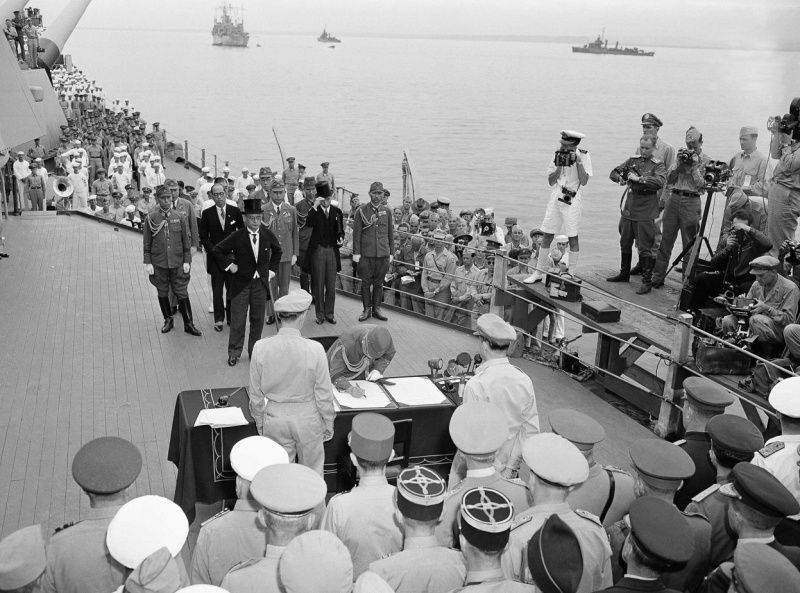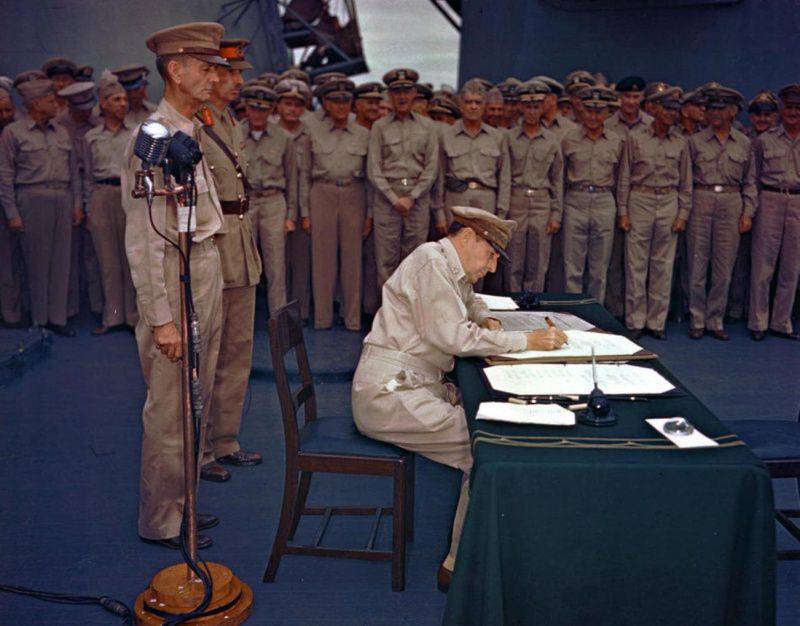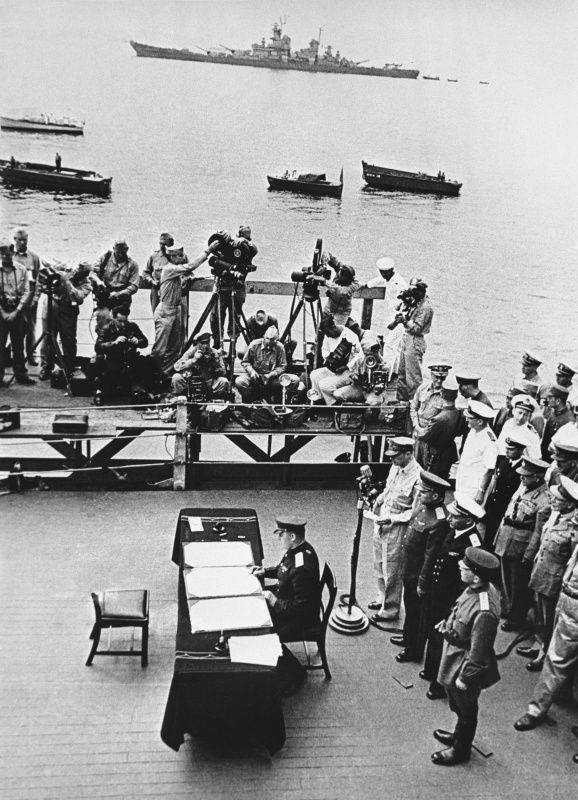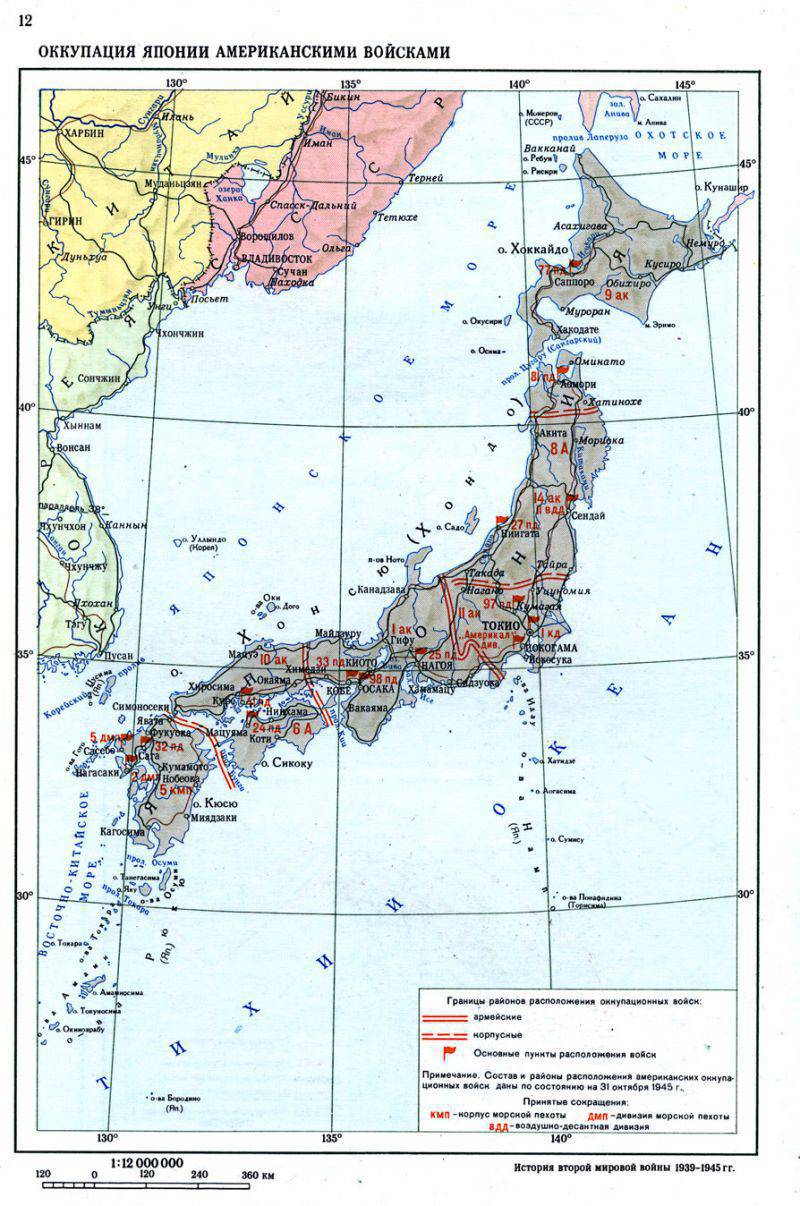70 Anniversary of the Surrender of Japan
At the same time, it is worth canceling that Japan, like Germany, was not a real instigator of world war. They played the role of figures in the Big Game, where the prize is the entire planet. The real instigators of the world massacre were not punished. Although it was the masters of the United States and Great Britain who unleashed a world war. The Anglo-Saxons festered Hitler and the project of the Eternal Reich. The dreams of the frenzied Fuhrer about the New World Order and the domination of the caste of the “elect” over the rest of the “subhumans” were just a repetition of English racial theory and social Darwinism. Britain had long been building the New World Order, where metropolises and colonies existed, dominions, it was the Anglo-Saxons who created the world's first concentration camps, not the Germans.
London and Washington sponsored the revival of the military power of Germany and gave it almost all of Europe, including France. To Hitler led the "crusade to the East" and crushed the Russian (Soviet) civilization, which carried in itself the beginnings of a different, fair world order, challenging the shadow masters of the Western world.
The Anglo-Saxons for the second time set off the Russians and the Germans to destroy the two great powers, whose strategic alliance could establish peace and prosperity in Europe and a large part of the world for a long time. At the same time, an elite clash took place within the western world itself. The Anglo-Saxon elite dealt a powerful blow to the old Germanic-Romanesque elite, seizing the leading position in Western civilization. The consequences for Europe were dire. The Anglo-Saxons so far control Europe, sacrificing its interests. European nations are sentenced, they must be assimilated, become part of the “global Babylon”.
However, not all global intentions of the owners of the Western project were realized. The Soviet Union not only was not destroyed and survived in the hardest battle with the united forces of Europe, but also became a superpower, which thwarted the plans to establish the "Eternal Reich" (New World Order). For several decades, Soviet civilization has become for humanity a beacon of Good and Justice, a model of a different path of development. The Stalinist society of service and creation was an example of the society of the future, which can save humanity from the impasse of the consumer society, which leads people to degradation and a global catastrophe.

The Chief of General Staff, General Umedzu Yosidziro, signs the Japan Surrender Act. Behind him is Japanese Minister of Foreign Affairs Shigemitsu Mamoru, who has already signed the Act.

General Douglas MacArthur signs the surrender of Japan

Lieutenant General K. N. Derevyanko on behalf of the USSR signs the Japan Surrender Act aboard the American battleship Missouri
Japan's surrender
The crushing offensive of the Soviet Army, which led to the defeat and surrender of the Kwantung Army (Manchu Strategic Offensive; Breakthrough of the Kwantung Army Defense; The defeat of the Kwantung Army - a sample of genuine lightning war), dramatically changed the military-political situation in the Far East. All plans of the Japanese military-political leadership to drag out the war have collapsed. The Japanese government was afraid of the Soviet invasion of the Japanese islands and a radical change in the political system.
The blow of the Soviet troops from the northern direction and the threat of a consistent invasion of the Soviet troops through the narrow straits on the Kuril Islands and Hokkaido was considered more significant than the landing of Americans on the Japanese islands proper after they were transferred from Okinawa, Guam and the Philippines by sea. American troops hoped to drown in the blood of thousands of suicide bombers, and in the worst situation, to retreat to Manchuria. The blow of the Soviet Army deprived the Japanese elite of this hope. Moreover, the Soviet troops withdrew quickly to Japan, depriving Japan of bacteriological stocks weapons. Japan lost the ability to strike back at the enemy, use weapons of mass destruction.
At a meeting of the 9 Supreme Military Council on August 1945, the head of the Japanese government, Suzuki, said: "Joining the Soviet Union this morning puts us in a hopeless situation and makes it impossible to continue the war further." At this meeting, the conditions on which Japan agreed to the Potsdam Declaration were discussed. The Japanese elite was practically united in the opinion that it was necessary to preserve the imperial power at any cost. Suzuki and other "supporters of peace" believed that for the sake of preserving imperial power and preventing the revolution, it was necessary to capitulate immediately. Representatives of the military party continued to insist on the continuation of the war.
10 August 1945 The Supreme Military Council adopted the text of the statement to the Allied Powers, which was proposed by Prime Minister Suzuki and Foreign Minister Shigenori Togo. The statement was supported by Emperor Hirohito: “The Japanese Government is ready to accept the terms of the 26 Declaration of July of this year, to which the Soviet Government also acceded. The Japanese Government understands that this Declaration does not contain requirements that restrain the prerogatives of the emperor, as the sovereign ruler of Japan. The Japanese Government is asking for a specific notice on this. ” 11 August the governments of the USSR, the USA, Great Britain and China transmitted the answer. It said that the power of the emperor and the government of Japan from the moment of surrender will be subordinated to the supreme commander of the Allied powers; the emperor must ensure that Japan has signed the terms of surrender; the form of government in Japan will ultimately be in accordance with the Potsdam Declaration established by the freely expressed will of the people; Allied forces will remain in Japan until the goals set out in the Potsdam Declaration are achieved.
Meanwhile, controversy continued in the Japanese elite. And in Manchuria, there were fierce battles. The military insisted on continuing the struggle. 10 of August published a message from Army Minister Koretik Anami to the troops, which emphasized that it was necessary “to bring the holy war to the end.” The same appeal came 11 August. Tokyo Radio 12 August conveyed a message stating that the army and navy, "fulfilling the highest order, commanding to protect the homeland and the highest person of the emperor, went everywhere to active combat operations against the allies."
However, no orders could change the reality: the Kwantung Army was defeated, and it was pointless to continue resistance. Under pressure from the emperor and the "party of peace", the military was forced to accept it. 14 on August at a joint meeting of the Supreme Military Council and the government in the presence of the emperor, it was decided to unconditionally surrender Japan. In the emperor's decree on Japan’s acceptance of the conditions of the Potsdam Declaration, the main place was given to the preservation of the “national state system”.
On the night of August 15, supporters of the continuation of the war mutinied and occupied the imperial palace. They did not encroach on the life of the emperor, but wanted to change the government. However, by the morning of August 15, the insurgency was crushed. 15 August the population of Japan for the first time in stories his country heard the emperor's speech on the radio (in writing) about unconditional surrender. On this day and later, many soldiers committed samurai suicide - seppuku. So, 15 August committed suicide by Army Minister Koretikka Anami.
This is a characteristic feature of Japan - a high level of discipline and responsibility among the elite, which continued the tradition of the military class (samurai). Considering themselves guilty for the defeat and misfortune of the motherland, many Japanese preferred to commit suicide.
The USSR and the Western powers differed in their assessment of the Japanese government’s statement of surrender. The United States and Great Britain considered that the 14-15 of August were the last days of the war. 14 August 1945 was the "day of victory over Japan." At this point, Japan did indeed cease hostilities against the US-British armed forces. However, hostilities continued in Manchuria, Central China, Korea, Sakhalin and the Kuril Islands. There, the Japanese in several places resisted until the end of August, and only the Soviet offensive forced them to lay down their arms.
When it became known about the readiness of the Japanese empire to capitulate, the question arose of appointing the supreme commander-in-chief of the Allied powers in the Far East. Its function was to include the adoption of the general surrender of the Japanese armed forces. The American government of August 12 proposed for this post General D. MacArthur. Moscow agreed with this proposal and appointed Lieutenant General KN Derevyanko the USSR representative under the supreme commander of the allied armies.
15 August, the Americans announced the draft "General Order number 1", which indicated areas of acceptance of the surrender of the Japanese troops of each of the allied powers. The order stipulated that the Japanese would surrender to the Commander-in-Chief of the Soviet troops in the Far East in Northeast China, in northern Korea (north of the 38 parallel) and on South Sakhalin. The surrender of the Japanese troops in southern Korea (south of the 38 parallel) was to be accepted by the Americans. The American command refused to conduct an amphibious assault operation in South Korea in order to interact with the Soviet troops. The Americans preferred to land the troops in Korea only after the end of the war, when there was no risk.
Moscow as a whole did not object to the general content of General Order No. 1, but made several amendments. The Soviet government proposed that all the Kuril Islands, which by agreement in Yalta were transferred to the Soviet Union and the northern part of Hokkaido, be included in the surrender area of Japanese forces to Soviet troops. The Americans did not raise serious objections to the Kuril Islands, since the issue of them was resolved at the Yalta Conference. However, the Americans still tried to nullify the decision of the Crimean Conference. On August 18, 1945, on the day the Kuril operation began, Moscow received a message from US President Truman stating the desire of the United States to obtain the rights to create aviation bases on one of the Kuril Islands, presumably in the central part, for military and commercial purposes. Moscow resolutely rejected these claims.
Regarding the question of Hokkaido, Washington rejected the Soviet proposal and insisted that the Japanese troops on all four islands of Japan itself (Hokkaido, Honshu, Shikoku and Kyushu) surrendered to the Americans. At the same time, the United States did not formally deny the USSR the right to temporarily occupy Japan. "General MacArthur," the American president reported, "will use symbolic allied armed forces, which, of course, will include the Soviet armed forces, for the temporary occupation of that part of Japan itself, which it deems necessary to occupy in order to fulfill our union surrender conditions." But in fact, the United States relied on unilateral control in Japan. Truman 16 August spoke at a conference in Washington and said that Japan would not, like Germany, be divided into occupation zones, that all Japanese territory would be under the control of Americans.
In fact, the United States refused allied control in post-war Japan, as provided for by the Potsdam Declaration of 26 in July 1945. Washington was not going to lose Japan from its sphere of influence. Japan before the Second World War was under the great influence of Britain and the USA, now the Americans wanted to restore their positions. The interests of American capital were also taken into account.
After 14, the United States more than once tried to put pressure on the USSR in order to stop the Soviet offensive against the Japanese. The Americans wanted to limit the zone of Soviet influence. If Russian troops did not occupy South Sakhalin, the Kuriles and North Korea, then American forces could appear there. 15 August MacArthur handed over to the Soviet General Headquarters a directive on the cessation of offensive operations in the Far East, although the Soviet troops did not obey the Allied command. Then the allies were forced to admit "error." Like, they passed the directive not for “execution”, but for “information”. It is clear that this position of the United States did not contribute to the strengthening of friendship between the allies. It became clear that the world is moving towards a new clash - now between former allies. The United States tried to stop the further spread of the zone of Soviet influence with rather tough pressure.
This policy of the United States was on hand to the Japanese elite. The Japanese, as before, and the Germans, to the last hoped that a major conflict would occur between the allies, even an armed conflict. Although the Japanese, as before the Germans, miscalculated. At this point, the United States relied on Kuomintang China. The Anglo-Saxons first used Japan, provoking it to the outbreak of hostilities in the Pacific, to aggression against China and the USSR. True, the Japanese dodged and, having received tough military lessons, did not attack the USSR. But in general, the Japanese elite lost, being drawn into a war with the United States and Britain. Weight categories were too different. The Anglo-Saxons used Japan, and in 1945 it was time to put it under complete control, up to and including the military occupation, which persists to the present. Japan became at first practically an open colony of the USA, and then a semi-colony, an dependent satellite.
All the preparatory work on the organization of the official Surrender Act was carried out at MacArthur’s headquarters in Manila. 19 August 1945 representatives of the Japanese headquarters, led by the deputy chief of the General Staff of the Imperial Army of Japan, Lieutenant-General Torasiro Kawabe, arrived here. It is characteristic that the Japanese sent their delegation to the Philippines only when they finally became convinced that the Kwantung Army was defeated.
On the day of the arrival of the Japanese delegation at MacArthur’s headquarters there was received by radio from Tokyo a “denunciation” of the Japanese government to the Soviet troops, who launched an operation in the Kuril Islands. The Russians were accused of violating the “prohibition of military actions” that allegedly existed after 14 in August. It was a provocation. The Japanese wanted the Allied Command to intervene in the actions of the Soviet troops. 20 August MacArthur stated: "I sincerely hope that in anticipation of a formal signing of the surrender, a truce will prevail on all fronts and that the surrender can be carried out without spilling blood." That is, it was a hint that Moscow was to blame for the "shedding of blood". However, the Soviet command was not going to stop fighting before the Japanese ceased resistance and laid down their arms in Manchuria, Korea, South Sakhalin and the Kuril Islands.
The Surrender Act, agreed by the Allied countries, was handed over to Japanese representatives in Manila. General MacArthur 26 of August notified the Japanese bid that the American fleet had begun to move to Tokyo Bay. The structure of the American Armada was about 400 ships, and 1300 aircraft, which were based on aircraft carriers. 28 on August at Atsugi airfield, near Tokyo, advanced American forces landed. 30 August began the mass landing of American troops in the area of the Japanese capital and in other areas of the country. On the same day, MacArthur arrived and took control of the Tokyo radio station and set up an information bureau.
For the first time in the history of Japan, its territory was occupied by foreign troops. She had never had to capitulate. On September 2, 1945, the ceremony of signing the Act of Surrender took place on board the American battleship Missouri in Tokyo Bay. On behalf of the Japanese government, the Act was signed by Foreign Minister Mamoru Shigemitsu, and the Chief of the General Staff, General Yoshiziro Umezu, signed the Act. On behalf of all the allied nations, the Act was signed by the Supreme Commander of the Allied Armies, US Army General Douglas MacArthur, on behalf of the United States - Admiral fleet Chester Nimitz, from the USSR - Lieutenant General Kuzma Derevyanko, from China - General Xu Yongchang, from Britain - Admiral Bruce Frazer. Representatives of Australia, New Zealand, Canada, Holland and France also signed.
According to the Surrender Act, Japan accepted the terms of the Potsdam Declaration and declared the unconditional surrender of all armed forces, both its own and under its control. All Japanese troops and the population were ordered to immediately cease hostilities, save ships, aircraft, military and civilian property; the Japanese government and the General Staff were ordered to immediately release all allied prisoners of war and civilian internees; the authority of the emperor and the government was subordinated to the supreme Allied command, which should take measures to implement the conditions of surrender.
Japan finally stopped resistance. The occupation of the Japanese islands by American forces began with the participation of British forces (mainly Australians). Co 2 September 1945 ended the surrender of the Japanese troops who opposed the Soviet Army. At the same time, the remnants of the Japanese forces in the Philippines capitulated. The disarmament and the capture of other Japanese groups has been delayed. September 5 British landed in Singapore. September 12 Singapore signed the Surrender Act of the Japanese Armed Forces in Southeast Asia. September 14 the same ceremony took place in Malaya, September 15 - in New Guinea and North Borneo. September 16 British troops entered Hong Kong (Hong Kong).
The capitulation of the Japanese troops in Central and Northern China took place with great difficulty. The Soviet offensive in Manchuria created favorable opportunities for the liberation of the rest of China from invaders. However, the Chiang Kai-shek regime adhered to its line. The Kuomintang now considered not the Japanese, but the Chinese Communists, as the main opponent. Chiang Kai-shek made a deal with the Japanese, imposing on them the “duty of maintaining order”. In the meantime, the people's liberation forces were successfully advancing in areas of northern, central and southern China. Within two months, from 11 August to 10 in October 1945, 8-th and New 4-I people's armies destroyed, wounded and captured more than 230 thousands of Japanese and puppet troops. People's troops liberated large areas and dozens of cities.
However, Chiang Kai-shek continued to bend his line and tried to forbid accepting the surrender of the enemy. The transfer of the Kuomintang troops on American planes and ships to Shanghai, Nanjing and Tanjing was organized under the pretext of disarming the Japanese forces, although these cities were already blocked by the people's forces. Kuomintang was thrown to increase pressure on the people's army of China. At the same time, Japanese troops took part in the hostilities on the side of the Kuomintang for several months. The signing of the October 9 capitulation by Japanese troops in Nanking was formal. The Japanese were not disarmed, and until the 1946 year they fought as mercenaries against popular forces. Japanese soldiers formed volunteer units to fight the communists and used them to guard the railways. And three months after the capitulation of Japan, tens of thousands of Japanese soldiers did not lay down their arms and fought on the side of the Kuomintang. General Teiji Okamura, the Japanese commander-in-chief in China, was still sitting in his headquarters in Nanking and was now subordinate to the Kuomintang government.
Modern Japan should remember the 2 lesson of September 1945. The Japanese should be aware that the Anglo-Saxons set them off in 1904-1905. with Russia, and then for decades set Japan on Russia (USSR) and China. What exactly the United States subjected the Yamato race to an atomic bombardment and turned Japan into its semi-colony. That only friendship and a strategic alliance between Moscow and Tokyo can provide a period of long prosperity and security in the Asia-Pacific region. The Japanese people do not have to repeat the old mistakes in the 21st century. Enmity between the Russians and the Japanese is beneficial only to the owners of the Western project. There is no fundamental contradiction between the Russian and Japanese civilization, and they themselves are doomed to creation by history. In the future, the Moscow-Tokyo-Beijing axis can provide peace and prosperity in most parts of the Eastern Hemisphere for centuries. The union of three great civilizations will keep the world from chaos and catastrophe, to which the masters of the West are pushing humanity.

Information